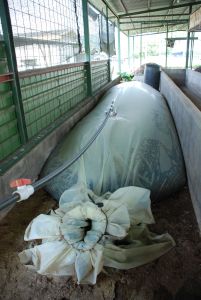Biomethane
What is Biomethane

Biomethane is a naturally occurring gas which is produced during breakdown of organic matter such as dead plants and animals, animal waste, kitchen waste, sewage, etc.. Chemically, it is identical to natural gas but unlike the latter, biomethane is produced from organic waste material in biogas plants. Since it is chemically identical to natural gas, biomethane has the same applications as natural gas including space and water heating, fuel and electricity generation.
Advantages of Biomethane
-
Reduced carbon emissions. Just like natural gas, biomethane releases some carbon dioxide and other greenhouse gases into the atmosphere. But these would be released anyway if the organic matter that is used for biomethane production would simply be left to decompose.
-
Sustainability. Organic matter that is needed to produce biomethane is indefinite. It is also available in sufficient amounts all over the world regardless of geographical position and weather conditions which play an important role in utilisation of other alternative sources of energy such as solar energy and wind power.
-
Ease of application. Since biomethane is identical to natural gas, its utilisation does not require development of new technology or new infrastructure.
-
Reduced pressure on the landfills. Biodegradable waste goes to biogas plants rather than landfills. This in combination with recycling, dramatically reduces the pressure on the landfills.
-
Low production cost. Biomethane is produced from waste organic matter which is available for free. In addition, no edge-cutting technology is required to capture biomethane from decomposing organic matter.
-
Energy independence. Unlike most types of energy that depend from international supply in the form of raw material such as uranium for nuclear power plants or direct supply such as fossil fuels, biomethane eliminates vulnerability to disruptions in the international energy supply market.
Disadvantages of Biomethane
-
Odour. Some people who live nearby biogas plants complain about them producing unpleasant odours.
-
Risk of explosion. Methane is highly explosive. Its production and transportation therefore require a high level of precaution.
-
Loss of organic fertilisers and compost. Biomethane production requires large quantities of organic waste and there are concerns that increased production of biogas could cause shortages of supply with organic fertilisers and compost.
-
Limited generation of electricity. Even if all organic waste would be collected by biogas plants, the amount of produced electricity would not be able to meet the demand.